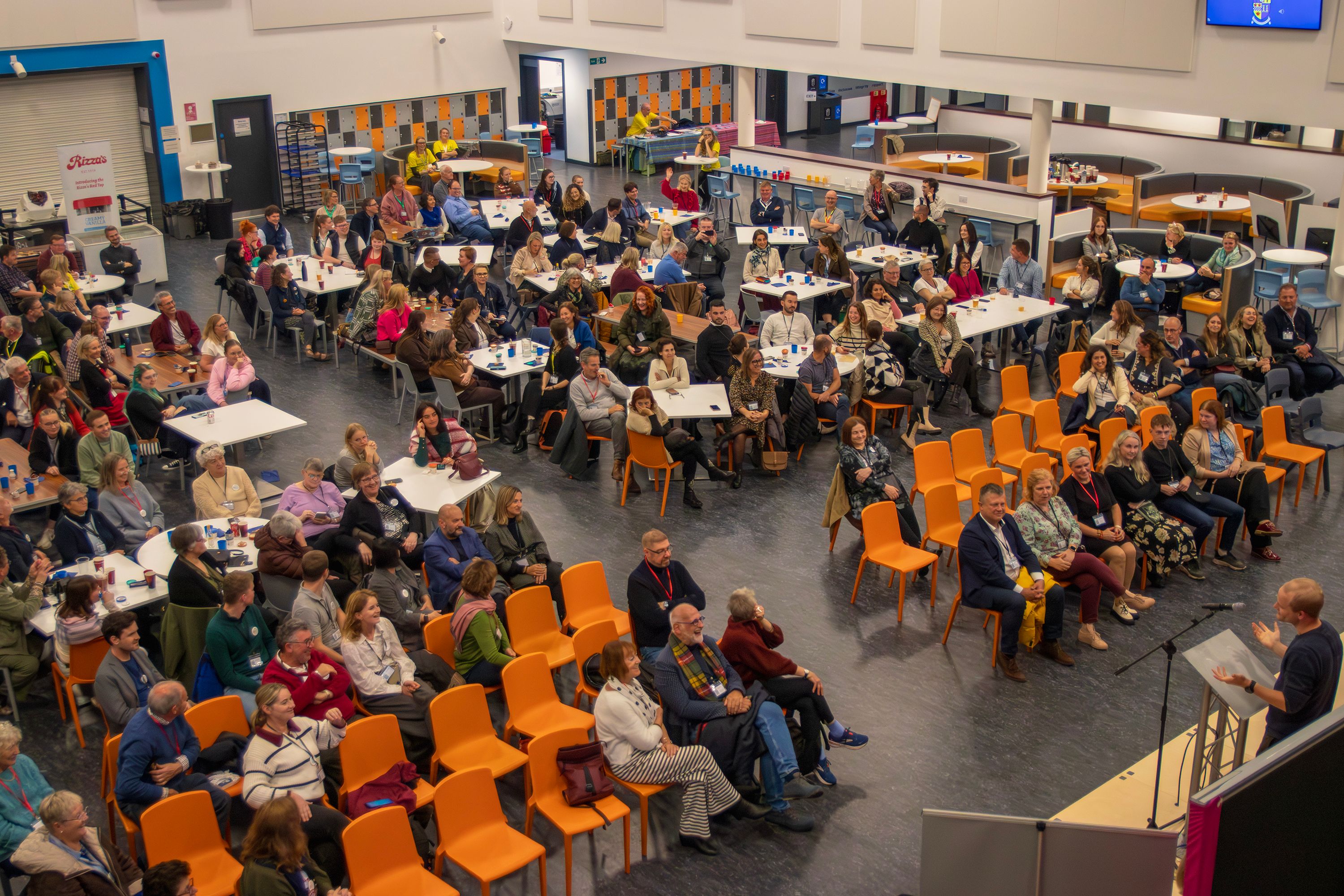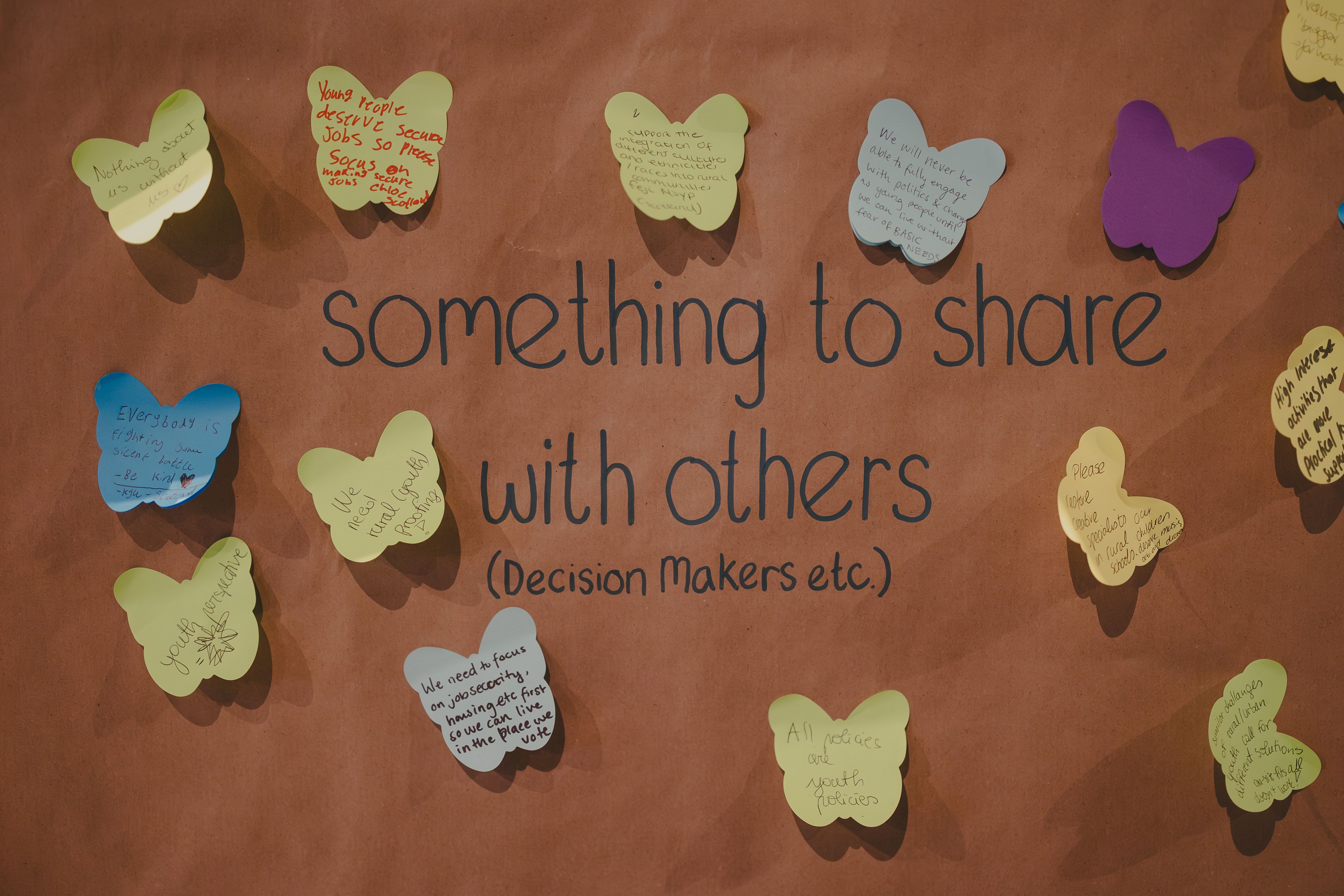CrownShy at the European Rural Parliament
By Shu Yang Lin
about 2 months ago

In October 2025, CrownShy had the privilege of supporting the 6th European Rural Parliament (ERP) in Inverurie, Scotland — a biennial gathering of over 400 rural and island leaders, entrepreneurs, academics and policymakers from 43 European countries. The event, themed “Strength from Opportunity: Rural Community Solutions to Global Challenges,” aimed to shape the Declaration of Inverurie, a key document contributing to the EU Rural Pact and the EU Long-Term Vision for Rural Areas.
Our role
CrownShy was invited to collaborate with the Scottish Government and Scottish Rural Action (SRA) on an experimental project exploring how our Comhairle platform could support the synthesis of participant input from the four-day assembly. The challenge: distil hundreds of contributions into clear, usable insights to inform the Declaration, which will be used as a lobbying and awareness-raising tool, until the next rural parliament
Our process
Working with data (320 responses) collected by Scottish Rural Action (SRA), we generated three reports based on participants’ reflections and messages for the Declaration of Inverurie. For these reports we utilised the open source AI tool Talk to the City which distills large-scale public input while preserving the diversity of views represented.
Some of the key insights that emerged include:
1. Recognising rural communities as partners: Rural communities, especially young people and women, must be recognised as key partners in shaping Europe’s future. This insight is supported by claims such as: “Implementing gender quotas and supporting women’s voices,” “Recognising youth as equal partners in community initiatives,” and the comment that: “Young people should be allowed to take part in decision making equally, not just consulted as a 'tick box' to meet targets[…]” along with other contributions.
2. Rural-proofed, inclusive policies: Policies at all levels need to be rural-proofed, inclusive, and community-led. This is reinforced by statements including: “Local and national Governments and the EU must Rural Proof all policies and strategies as a Right to people living in rural areas,” and the emphasis that local people must be involved in “early stage of planning, not in the final steps just before approving.”
3. Investing in local knowledge and resilience: A bold shift is needed—trusting local knowledge, strengthening community resilience, and investing in people and places so rural Europe can thrive sustainably. Supporting inputs includes: “Communities are best able to help themselves when they have their own resources and assets — such as buildings, land or facilities — that they can use for childcare, healthcare, tourism or employment,” “Invest in community-led solutions to rural challenges,” and the recognition that: “Strong communities are the foundation of security and resilience in times of crisis,” and “Extractive economic models have contributed to depopulation and climate change. An economy that works for people and place is crucial for the sustainability of our rural communities.”
Together, these reports surfaced the most resonant themes, shared values, and practical ideas emerging from the four-day gathering — providing a structured foundation for the drafting of the Declaration of Inverurie.

Exploration and learning
About a month before the event, we started working closely with SRA to address the challenge of a tight turnaround. Traditionally, the event organisers manually reviewed input in the evening to draft a declaration by the next day. Given only 24 hours between receiving data and generating insights for the Declaration, we needed a fast and reliable workflow. We explored several approaches to incorporate human oversight, aiming to involve onsite practitioners in reviewing and guiding the report generation. This ensured that the automatically generated themes aligned with their understanding of participant input, thereby making the output trustworthy.
For this process we ran two parallel systems: the existing Talk to the City (TTTC) platform and an experimental, TTTC-inspired tool we called “Roots.” This "Roots" version was designed to make human intervention easier and more transparent. While TTTC was initially used to produce intermediary reports, and demonstrate the idea of surfacing near real-time clustering of discussion themes, our exploration gradually led to the creation of a customised, event-specific system. This enhanced tool extended TTTC’s capabilities, offering a more comprehensive approach that allows practitioners to remove, rename or insert thematic clusters, making the report generation process an iterative process that allows the human in the loop intervention.
At SRA’s request, we also collaborated with the TTTC development team to introduce a new feature: opinion auditing. This feature provides a transparent record explaining why certain inputs were rejected by the language model — for example, if they were redundant (e.g., “yes,” “well”) or accidentally submitted multiple times. The TTTC team quickly built and deployed a prototype and pushed to their live system, enhancing transparency in AI-powered inputs processing.
Through several iterations and feedback sessions with SRA, we clarified workflows, refined data handling, and established clear roles between human input and AI analysis. Ultimately, this iterative process helped both teams understand what was technically feasible within the event’s timeframe, and which approach offered the most robust and trustworthy results.
The result
Our analysis was used directly in shaping the Declaration of Inverurie. As shared by Marie Permingeat, Policy and Insights Lead at ELARD:
“We did use it, most particularly the proposed prompts, to draft the final text. It probably cut the writing time by more than half… it captured things very neatly.”
This feedback reinforces the potential of Comhairle and Talk to the City to meaningfully enhance collaborative policymaking. It supports organisers and facilitators to focus on interpretation and action rather than manual data sorting.
Looking ahead
This pilot marks an important step in demonstrating how AI-supported participation tools can make large-scale democratic processes more efficient, transparent, and inclusive while still allowing humans to guide the AI generated insights. We’re grateful to our partners at SRA and the Scottish Government, for the opportunity to explore this new frontier in civic engagement, and to the TTTC team for their timely support in enhancing the platform’s capabilities.